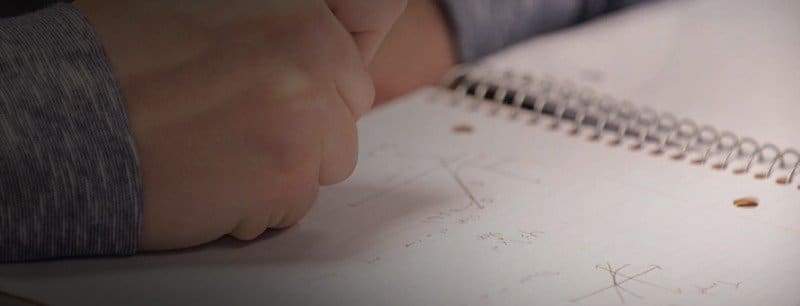
Become a Versatile Asset as a Mathematics Major at SNHU
Math majors are versatile - a big plus if you value the freedom to explore a variety of career paths in your lifetime. As a math major, you can apply your quantitative, analytical and problem-solving skills in an almost unlimited number of fields and positions. SNHU's Bachelor of Arts in Mathematics lets you take your passion for numbers, proofs and problem solving to the next level.
When you earn your undergraduate degree in mathematics at SNHU, you'll develop an advanced ability in mathematical methods, reasoning and problem solving in three main areas of math: analysis, algebra and statistics. In addition to a broad base of mathematical knowledge, you'll become proficient in communicating about math, both orally and in writing.
See Yourself Succeed in Mathematics
Whether you want to land a position in a quantitative field such as finance, economics, computer programming or statistics, or further your studies so you can ultimately pursue a career as a mathematician, the BA Mathematics degree program provides a strong foundation for building your future in some of the fastest growing careers.
During your studies, you'll gain an understanding of:
- How to solve real-world problems involving calculus, including integration, trigonometric functions, differential equations, Taylor polynomials and infinite series
- Direct, contrapositive, contradiction and induction methods of proof, as well as the relationship between problem-solving and the process of proving
- Applying statistical techniques to a variety of applications in business and the social sciences, including probability distribution functions, sampling distributions, estimation, hypothesis testing and linear regression
- Mathematical topics related to the design, programming and application of computers: propositional logic, number systems, algorithms and pseudocode, encryption, matrix manipulation, combinatorics and other topics
- Regression analysis and related topics, by hand and with a statistical software package.
- Applied linear algebra and matrices topics that could be used to model applied mathematics problems in business, science, computer science and economics
- Real analysis, addressing the transition from computational to theoretical calculus, with an emphasis on problem-solving and proof writing
As a private, nonprofit university, SNHU has one mission - to help you see yourself succeed. The benefits of earning your bachelor's degree in mathematics at SNHU include:
- Supportive community. Join the SNHU campus community of students who are closely connected with faculty and staff dedicated to your success.
- Affordability. It’s our mission to make higher education more accessible. That’s why, SNHU is one of the most affordable private, nonprofit universities in New Hampshire.
- Accessible faculty. Learn from highly credentialed faculty who are experts in their fields and interact with you in the classroom, dining hall, fitness center and the stands.
- Opportunity. Tap into our nationwide network of alumni and strong connections with employers for internship and career opportunities.
- Campus experience. Enjoy more than 50 student clubs, champion Division II athletics and fun events on our 300-acre campus in Manchester, NH, named a "Best Place to Live" by Money magazine.
Internships & Outcomes
Employers in a range of industries seek college graduates with quantitative, analytical and problem-solving skills. With a college degree in math from Southern New Hampshire University, you'll be prepared for a career in a variety of fields, including:
- Business
- Actuarial firms
- Financial services firms
- Utility companies
- Consulting
- Operations research firms
- Insurance agencies
- Technical journals
Mathematics majors enjoy a high degree of job satisfaction. One recent report even listed both mathematicians and statisticians in the top 5 best jobs of the year.2
And once you've developed your math skills and are ready to enter the workforce, you'll discover that the outlook is good: 33% projected growth for mathematicians and statisticians through 2030.1
The pay is another plus: In 2021, mathematicians earned a median annual salary of $108,100, statisticians earned a median annual wage of $95,570.1
Curriculum
From calculus to abstract algebra to statistics, the courses included in the mathematics major can help you develop advanced abilities in math. The skills you gain in this program are transferable across many industries and positions, allowing you to pursue a variety of career paths. If you decide to continue your studies with a graduate degree, your BA is good preparation.
SNHU faculty who teach in the mathematics program have years of experience as mathematicians and educators. They are well skilled in applying theories, principles and concepts of mathematics to real-world situations across a broad range of fields, such as business, economics, natural sciences and social sciences.
Classes are highly engaging and use a variety of teaching strategies to keep classes stimulating, among them participatory lectures, group work and fun, math-themed events featuring guest lectures and panel discussions.
Courses To Prepare You For Your Life & Career
SNHU's bachelor's in mathematics program includes:
- General education courses
- Degree-specific courses
General Education Program
SNHU's required general education program, known as The Commons, aims to guide you toward success in not only your academic career, but your personal and professional life too.
Throughout the curriculum, you'll gain some of the most in-demand skills in today's workplace, including:
- Research and information analysis
- Diverse audience communication
- Critical thinking and ethical problem solving
- Leadership, emotional intelligence and collaboration
This expertise will prove practical, transferable and invaluable as you grow in your career and contribute positively to society.
Beyond foundational skill development, the general education program also provides the benefit of allowing you to explore a wide range of fields outside of your intended major.
| View Full Curriculum in the Catalog |
|---|
| BA in Mathematics |
| Courses May Include | ||
|---|---|---|
| BA in Mathematics Campus | ||
| MAT 225 | Calculus I: Single-Variable Calculus | Calculus is the mathematical study of change that has widespread applications in science, engineering, economics and business. This course provides a rigorous introduction to single-variable calculus. Topics include limits, continuity, differentiation and integration of algebraic, trigonometric, exponential, and logarithmic functions, applications of derivatives, and integration, including the Fundamental Theorem of Calculus. This course will encourage students to think beyond memorizing formulas and to work towards understanding concepts. |
| MAT 275 | Calculus II: Integration and Series | This course is a continuation of MAT 225 that deepens a student's understanding of single-variable calculus. Students will learn new techniques of integration, including substitution, integration by parts, partial fractions, and integration tables. This course will also extend a student's knowledge of addition. That is, students already know how to add two, three, or n numbers together but, in this course they will learn how to add an infinitely many numbers together. This will enable students to represent differentiable functions-including exponential, trigonometric and logarithmic functions-as functions that look like polynomials with infinitely many terms. In doing so, students will enhance their abilities to evaluate and estimate integrals. Finally, students will also learn about parametric curves and polar coordinates-both useful tools for describing the motion of moving objects such as projectiles, planets, or satellites-in order to apply single-variable calculus skills in additional settings. |
| MAT 299 | Mathematical Proof and Problem Solving | This course introduces students to the language and methods used to create and write mathematical proofs and solve problems. Methods of proof will include: direct, contrapositive, contradiction, and induction. Methods of problem solving will be based on Polya's four steps for problem solving. Students will learn about and utilize the many functions of proof including: verification, explanation, communication, discovery, justification, and inquiry. The course will also explore the relationship between problem solving and the process of proving. Students will explore fundamental abstract concepts in mathematics including: functions and relations, set theory, number theory, and logic. |
| MAT 325 | Calculus III: Multivariable Calculus | Many real-world applications of calculus in science, engineering, economics, and business employ functions with many variables. This course extends the basic concepts of single-variable calculus developed in MAT 225 and MAT 275 to functions of several variables. Topics include vectors, the geometry of space, vector-valued functions, motion in space, partial derivatives and multiple integrals. |
| MAT 330 | Differential Equations | Differential equations are useful in modeling real-world phenomenon involving rates of change such as the spread of disease, the change in a population, the free fall of an object, and the decay of a radioactive substance. This is a first course in differential equations. Topics include solving first- and higher-order differential equations and modeling with first- and higher-order differential equations. |
| MAT 350 | Applied Linear Algebra | This is a first course in linear algebra and matrices. Topics include systems of linear equations, linear independence, matrices of linear transformations, matrix algebra, determinants, vector spaces, eigenvalues and eigenvectors. After mastering the basic concepts and skills, students will use their knowledge of linear algebra to model a selection of applied mathematics problems in business, science, computer science and economics. |
| MAT 415 | Abstract Algebra | Algebra is concerned with sets of objects and operations on these sets. This course will take students beyond the real number and polynomials to groups and other algebraic structures. In a modern, or abstract algebra course, one assumes a small number of basic properties as axioms and then proves many other properties from the axioms. This will assist the student in becoming more proficient at proof-writing. |
| MAT 470 | Real Analysis | This course provides a theoretical foundation for single-variable calculus concepts. Topics include the structure of the real numbers, sequences, continuity, differentiation and Riemann integration. This course will be run as a seminar that emphasize problem solving, proof writing and orally defending proofs. |
| Total Credits: 120 | ||

Campus Undergraduate Tuition
Our Manchester campus aims to keep tuition and related costs low for our students so that you can pursue your degree and your goals.
University Accreditation

Related Articles

Academic Spotlight: Senior Associate Dean of STEM Dr. Gary Savard

What is Information Security? Why It’s Important, Job Outlook and More


